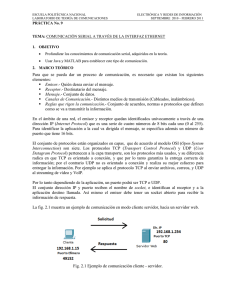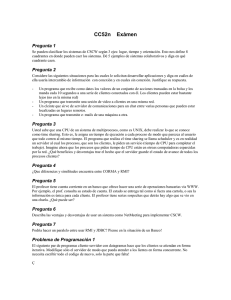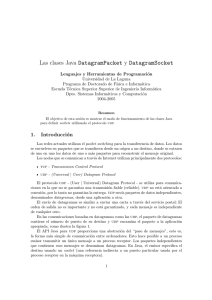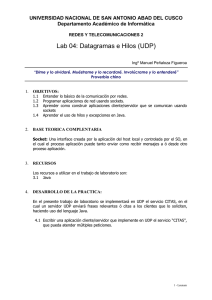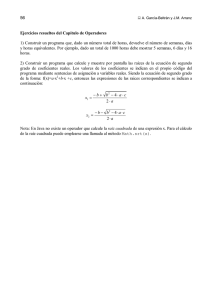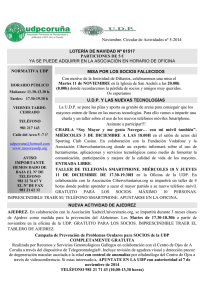Laboratorio de programación en red
Anuncio
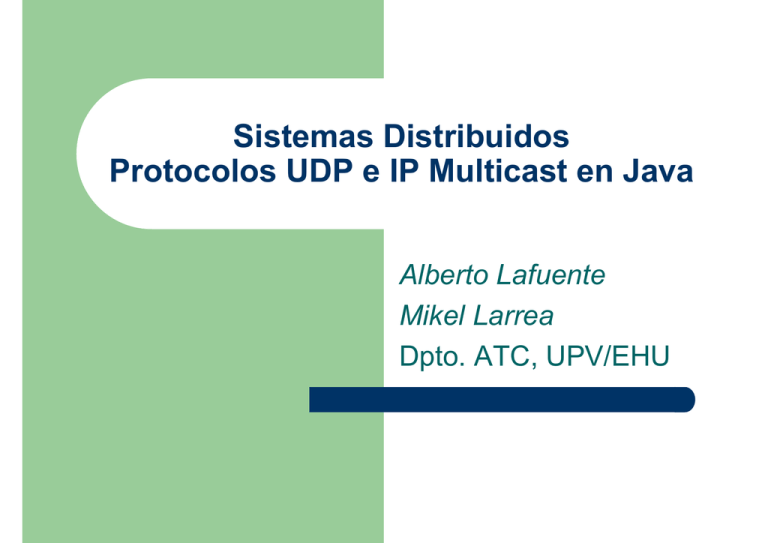
Sistemas Distribuidos
Protocolos UDP e IP Multicast en Java
Alberto Lafuente
Mikel Larrea
Dpto. ATC, UPV/EHU
Contenido
2
Receptor UDP (udp_r.java)
Emisor UDP (udp_s.java)
Ejercicio UDP
Receptor IP Multicast (ipmulticast_r.java)
Emisor IP Multicast (ipmulticast_s.java)
Ejercicio IP Multicast
Receptor UDP (udp_r.java) - 1/3
import java.net.*;
// This program waits to receive datagrams sent to a specified port.
// When it receives one, it displays the sending host and port,
// and prints the contents of the datagram as a string.
public class udp_r {
public static void main(String args[]) throws Exception {
if (args.length != 1) {
System.out.println("Usage: java udp_r <port>");
System.exit(0);
}
int port = Integer.parseInt(args[0]);
byte[] buffer = new byte[1024];
String s;
3
Receptor UDP (udp_r.java) - 2/3
// Create a socket to listen on the port.
DatagramSocket socket = new DatagramSocket(port);
System.out.println("Reception socket created...");
long expected = 1;
for(;;) {
// Create a packet with an empty buffer to receive data
DatagramPacket packet = new DatagramPacket(buffer,
buffer.length);
// Wait to receive a datagram
socket.receive(packet);
// Convert the contents to a string
s = new String(buffer, 0, packet.getLength());
// Get the seuqence number as a long
long sequence_number = Long.parseLong(s);
4
Receptor UDP (udp_r.java) - 3/3
if (sequence_number == expected) {
expected++;
System.out.println("udp_r: received from " +
packet.getAddress().getHostName() + ":" +
packet.getPort() + ": " + s);
}
else {
System.out.println("ERROR: unexpected sequence number: "
+ sequence_number);
System.exit(-1);
}
}
}
}
5
Emisor UDP (udp_s.java) - 1/3
import java.net.*;
// This program sends periodically a datagram to the specified (host &
port)
public class udp_s {
public static void main(String args[]) throws Exception {
if (args.length != 3) {
System.out.println("Usage: java udp_s <host> <port> <period in
ms>");
System.exit(0);
}
// Get the internet address of the specified host and the port
number
InetAddress address = InetAddress.getByName(args[0]);
int port = Integer.parseInt(args[1]);
6
Emisor UDP (udp_s.java) - 2/3
// Create a socket, and send the packet through it
DatagramSocket socket = new DatagramSocket();
System.out.println("Sending socket created...");
String s = new String();
long sequence_number = 0;
long period = Long.parseLong(args[2]);
for (;;) {
sequence_number++;
Long sequence = new Long(sequence_number);
s = sequence.toString();
// Convert the string s to an array of bytes
byte[] message = new byte[1024];
message = s.getBytes();
7
Emisor UDP (udp_s.java) - 3/3
// Initialize the packet with data and address
DatagramPacket packet = new DatagramPacket(message,
s.length(), address, port);
// send the packet through the socket
System.out.println("udp_s: sending message " +
sequence_number);
socket.send(packet);
// Wait for period milliseconds
Thread.sleep(period);
}
}
}
8
Ejercicio UDP
Probar los programas udp_r y udp_s
–
Probar con varios emisores a un receptor
–
Probar con diferentes periodos de envío
9
¿Qué sucede y por qué?
¿Se pierde algún mensaje? ¿Cuándo y por qué?
Adaptar udp_r y udp_s para que el emisor se
quede a la espera de la confirmación de la
correcta recepción de cada mensaje
Receptor IP Multicast - 1/2
import java.net.*;
import java.io.*;
10
public class ipmulticast_r {
public static void main(String[] args) throws Exception {
int port = 4000;
String message = null;
InetAddress address = null;
MulticastSocket socket = null;
DatagramPacket packet = null;
try {
address = InetAddress.getByName("224.0.0.1");
}
catch (UnknownHostException e) {
System.out.println("Error: " + e.toString());
}
Receptor IP Multicast - 2/2
try {
socket = new MulticastSocket(port);
socket.joinGroup(address);
}
catch(IOException e) {
System.out.println("Error: " + e.toString());
}
System.out.println("ipmulticast_r ready...");
while (true) {
byte buffer[] = new byte[1024];
packet = new DatagramPacket(buffer, buffer.length);
socket.receive(packet);
message = new String(buffer, 0, packet.getLength());
System.out.println("Received: " + message);
}
11
}
}
Emisor IP Multicast - 1/3
12
import java.net.*;
import java.io.*;
import java.util.Random;
public class ipmulticast_s {
public static void main(String[] args) throws Exception {
if (args.length != 1) {
System.out.println("Usage: java ipmulticast_s <your name>");
System.exit(0);
}
String message;
int n = 1;
InetAddress address = null;
MulticastSocket socket = null;
DatagramPacket packet = null;
Random r = new Random();
long t;
Emisor IP Multicast - 2/3
try {
address = InetAddress.getByName("224.0.0.1");
}
catch (UnknownHostException e) {
System.out.println("Error: " + e.toString());
}
try {
socket = new MulticastSocket();
// socket.setTimeToLive(255);
}
catch (IOException e) {
System.out.println("Error: " + e.toString());
}
13
Emisor IP Multicast - 3/3
while (true) {
message = args[0] + " sender's message #" +
Integer.toString(n++);
byte[] data = new byte[1024];
data = message.getBytes();
packet = new DatagramPacket(data, data.length, address, 4000);
socket.send(packet);
System.out.println("Sent: " + message);
t = (r.nextInt(10) + 1) * 100;
Thread.sleep(t);
}
}
}
14
// value between 100 and 1000
Ejercicio IP Multicast
Probar los programas ipmulticast_r e
ipmulticast_s
–
“Privatizar” dichos programas
–
–
15
Probar con varios emisores y varios receptores
Adaptar ipmulticast_r para que muestre sólo los
mensajes enviados desde un puerto dado
Adaptar ipmulticast_s para que envíe los
mensajes desde un puerto indicado por el usuario
